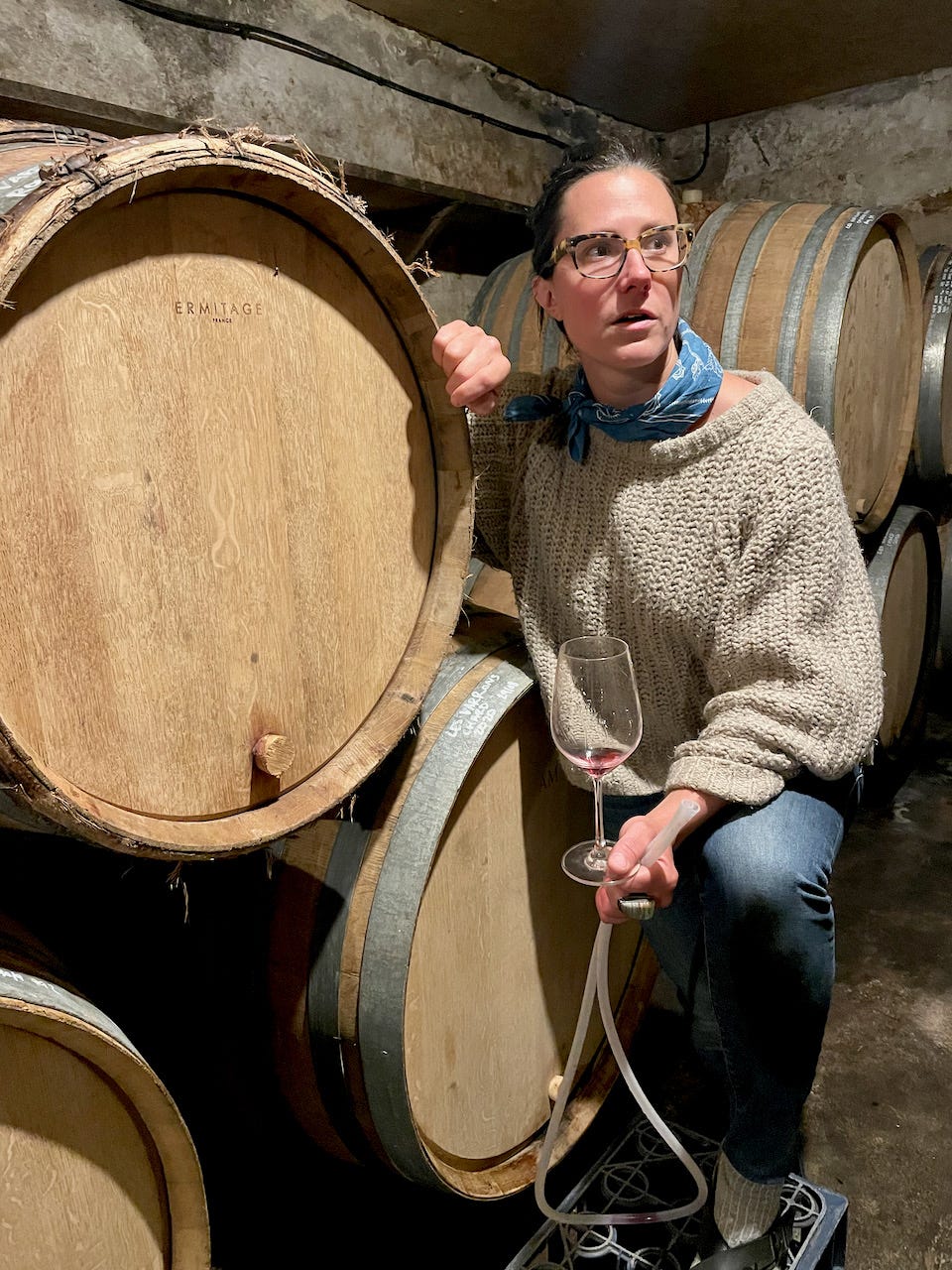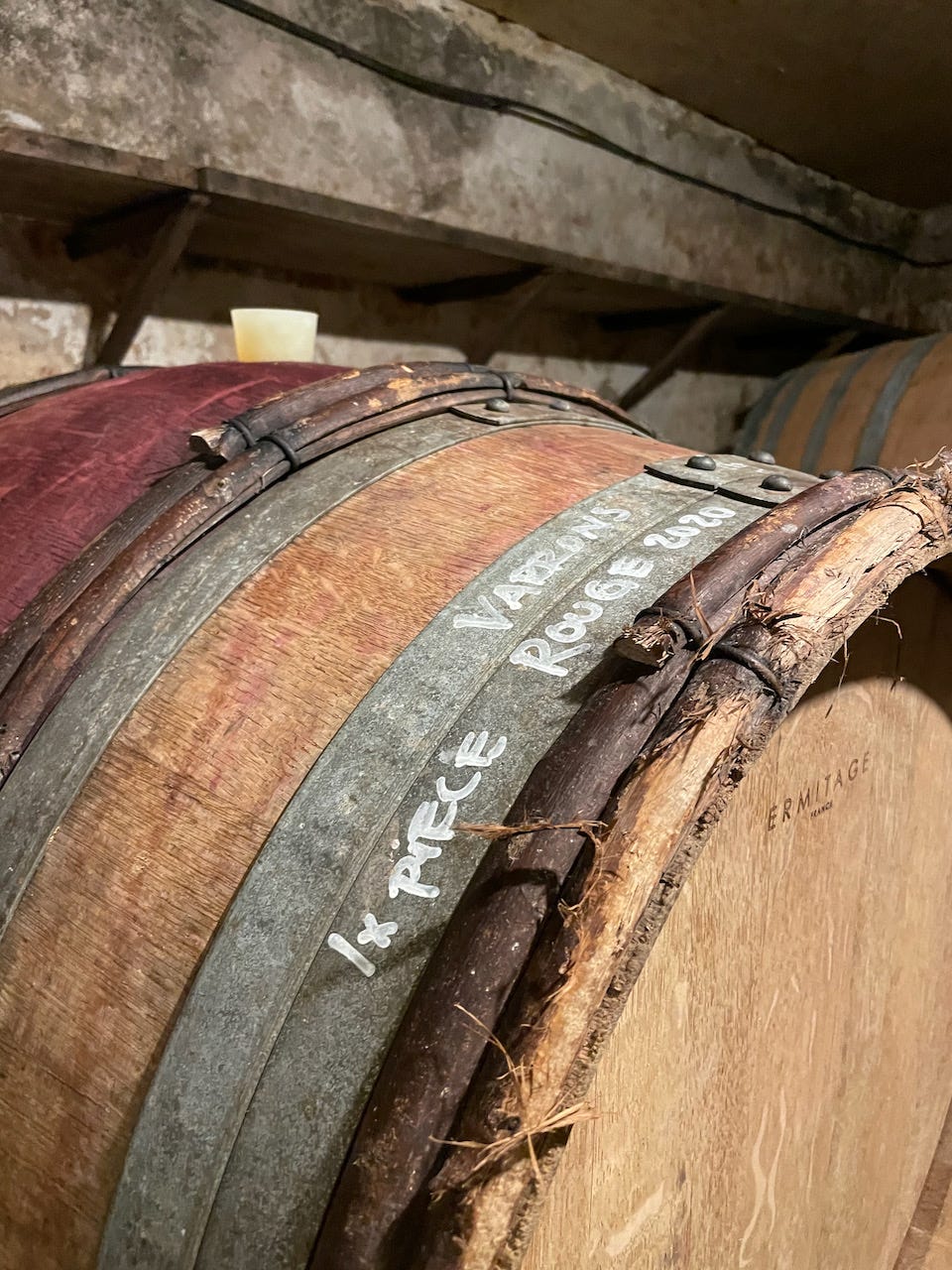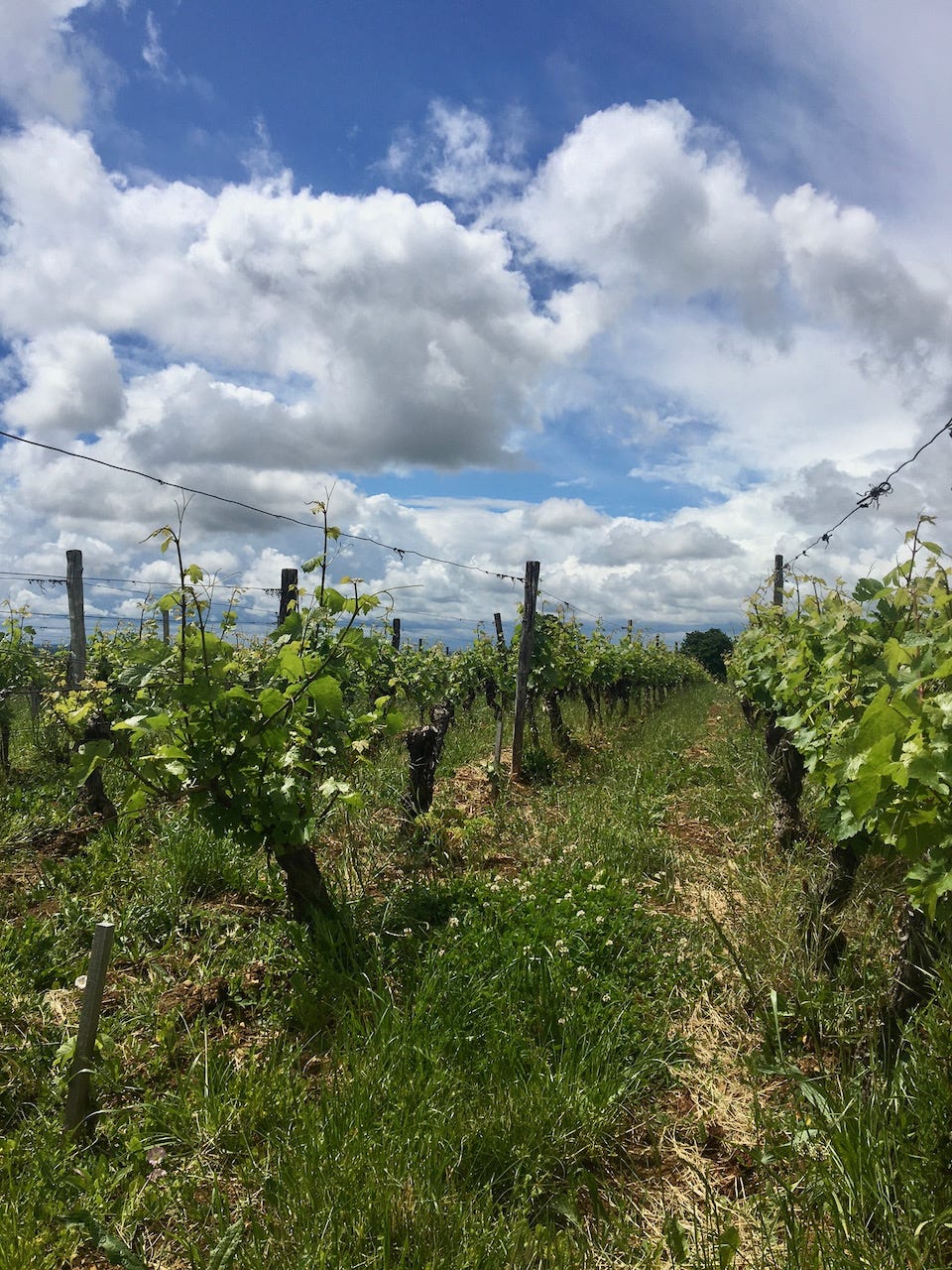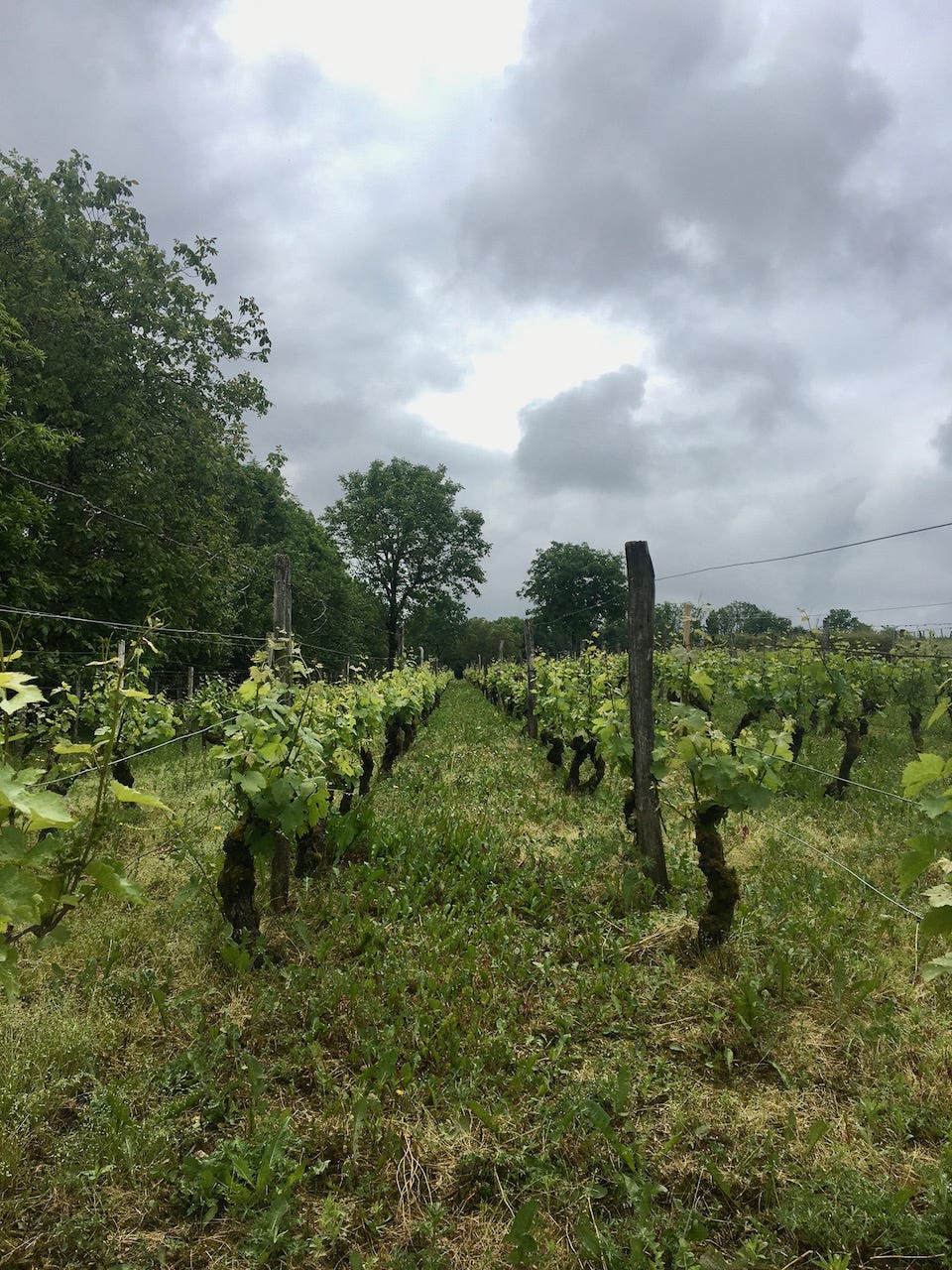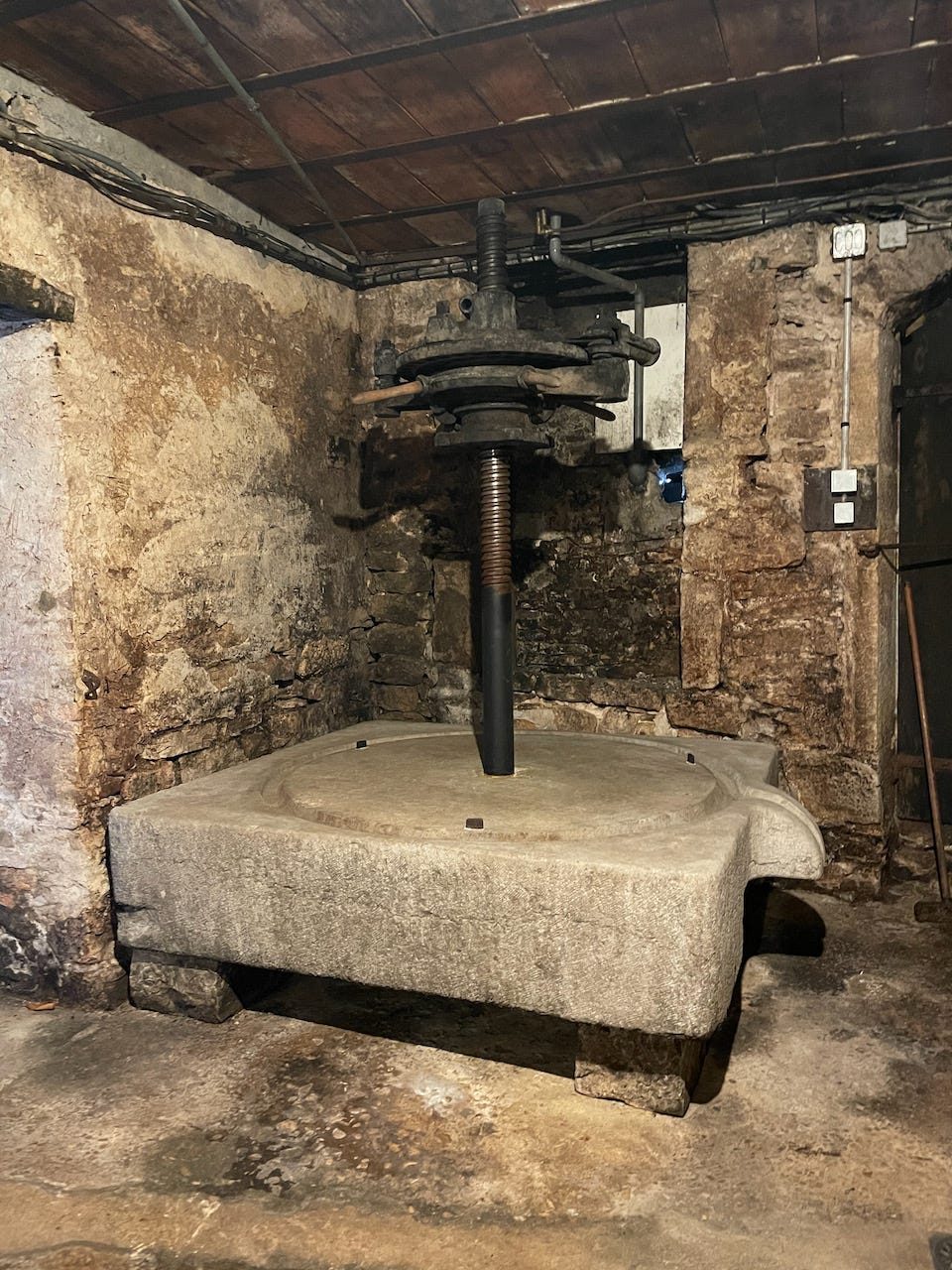Originally from Ottawa, Katie Worobeck came to France in 2017 to intern for Jean-François Ganevat. She wound up settling in the southern Jura, purchasing a house in Orbagna, and leasing a small parcel of chardonnay in “Les Varrans.” Alongside her continuing work for Ganevat, she made her winemaking debut in 2019 as Maison Maenad, with a négoçiant cuvée of Beaujolais gamay and a fascinating estate wine from field blend of very old, co-planted hybrids.
Quick Facts:
Katie Worobeck moved to France in 2017 to work for Domaine Ganevat, where she continues to work today. Previously she worked for a winery in Prince Edward Country, and did harvest at Bouchard Finlayson in South Africa in 2015.
Worobeck presently farms a miniscule vineyard surface, just 0.92ha. This includes a small parcel of gamay, a tiny hybrid parcel, and just over half a hectare in Les Varrons.
But she is finalizing the purchase of a 3ha plot with all five Jura varieties, situated near the vines of Kenjiro Kagami.
As of early May, she was planning to bottle some chardonnay this year, while leaving a few barrels to age longer. One barrel will see sous-voile aging.
I DON’T KNOW WHERE ELSE I WOULD GO
You can see why the Ganevat siblings wanted Katie Worobeck to stick around at the estate after her initial internship. Statuesque, strong, with a megawatt smile and a striking uptalk accent, Worobeck incarnates the fresh-faced positivity and can-do spirit that many comparatively morose French people associate with north America.
For her part, she never really thought about working for anyone but Ganevat in France.
“I don’t know where else I would go,” she says, over a beer on the back porch at the house she’s fixing up in the village of Orbagna. “He’s not the easiest to work for, but I don’t know where else I would see as many different things. We do savagnin and chardonnay and pinot noir and all of the négoce from all over France. And I just love the wines.”
Worobeck didn’t set out with the intention of becoming a vigneronne in far-flung southern Jura.
“It was all these little incremental steps. I was like, ‘Okay, I’ll stay another six months. Then another six months. Oh there’s a tiny bit of vines, I’m going to do that on the side,’” she says. “I’ve always lived like that. When interesting opportunities present themselves, I try to take them.”
Her first wine, a négoçiant cuvée of Beaujolais gamay called “Le Néant,” came about when Ganevat offered her some grapes by way of overtime pay during harvest 2019.
“It’s organic grapes from the Beaujolais, but I can’t tell you more than that,” she says, laughing. “I’ve never seen the parcel, which is horrible to say.”
I suspect the grapes come from the high-volume organic work of Lantignié’s Frédéric Sornin, who furnishes many, many natural négoçiant winemakers. This puts “Le Néant” in the company of gamays like that of Lorraine négoçiant Pierre Andrey, which is to say it’s middling source material ennobled by a painstakingly pure vinification. Worobeck calls the cuvée “an experiment in nothing”: whole-cluster fermentation, no pigeage or pumpovers, and bottled directly from the barrel.
Worobeck’s other 2019 wine is more unusual - downright unique, in fact. “Les Oubliées” derives from a minuscule 0.05-hectare parcel of very old, own-rooted, co-planted hybrids that she farms.
“The owner is in his 80s and his parents planted it,” she explains. There’s no precise record of which hybrid varieties they are. A few identifiable plants of chardonnay and gamay teinturier are among them. “The vines look like they’re about to die. But the tiniest little thing will give, like, this giant bunch.”
“Les Oubliées” stands out, in the extremely niche genre of naturally-vinified wines from hybrids, for its supple, savoury intensity. Its fruit recalls cool-vintage Bourgogne Passetoutgrain, only no one is really making that with Ganevat-like precision and purity. Worobeck, Canadianly, calls it “really neat.”
In the cellar below her dining room sits the lone barrel of 2020 “Les Oubliées,” along with eight or nine barrels of chardonnay. The latter derive from a 0.62ha surface of chardonnay she rents in “Les Varrons,” a lieu-dit of about 10ha that has the distinction of being farmed entirely organically by its various owners, who include the Buronfosses, the Ganevats, and the Labets.
Not all the barrels are dry as of early May; the dry ones have a force and a sterling acidity familiar from the work of her peers in the parcel.
It’s easy to share Worobeck’s excitement about her first vineyard purchase. To indulge in a north American-ism: she’s going to kick ass.
“It’s 3ha all together, this beautiful side of the hill,” she says. “There’s a little cabane in the middle, and it has all the Jura varieties. It’s so amazing.”
Most importantly, she says, it’ll allow her to explore her own ideas about regenerative agriculture and adapting to climate change. She plans to let grass grow, and pasture animals in the parcel.
THESE CRAZY WILD FREE WOMEN
“I have this idea in my head of a long-term project,” she says, as we head upstairs for lunch. (A splendid and bountiful roast chicken.) The name of the project - Maison Maenad - derives from the stories of Dionysus, the god of wine and pleasure.
“He has these amazon type of women who are with him in the stories, and their name is the maenads,” she explains. “These crazy wild free women are called the maenads.”
Maeson Maenad - Katie Worobeck
9 rue des Fontaines
39190 ORBAGNA



